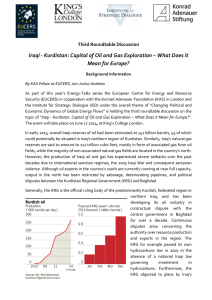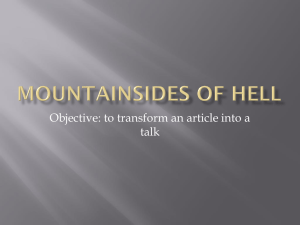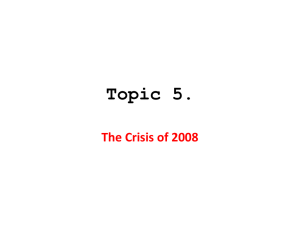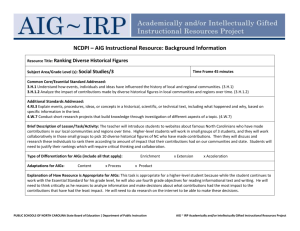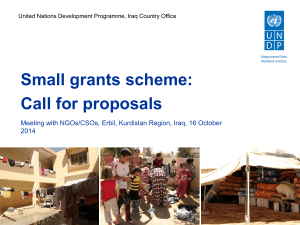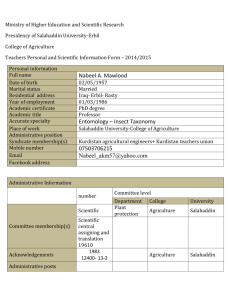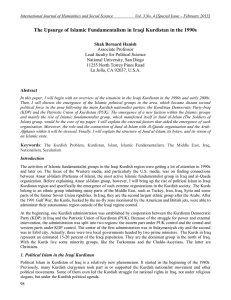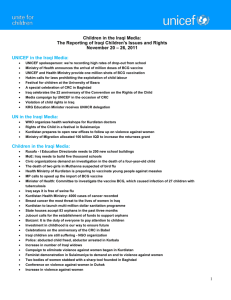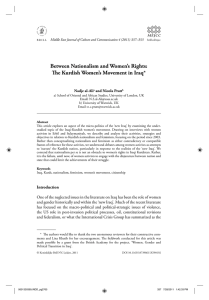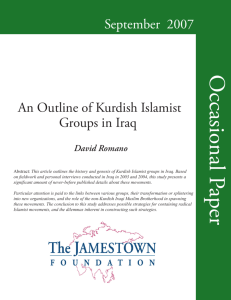Advisory - Iraq - 11 August 2014
advertisement
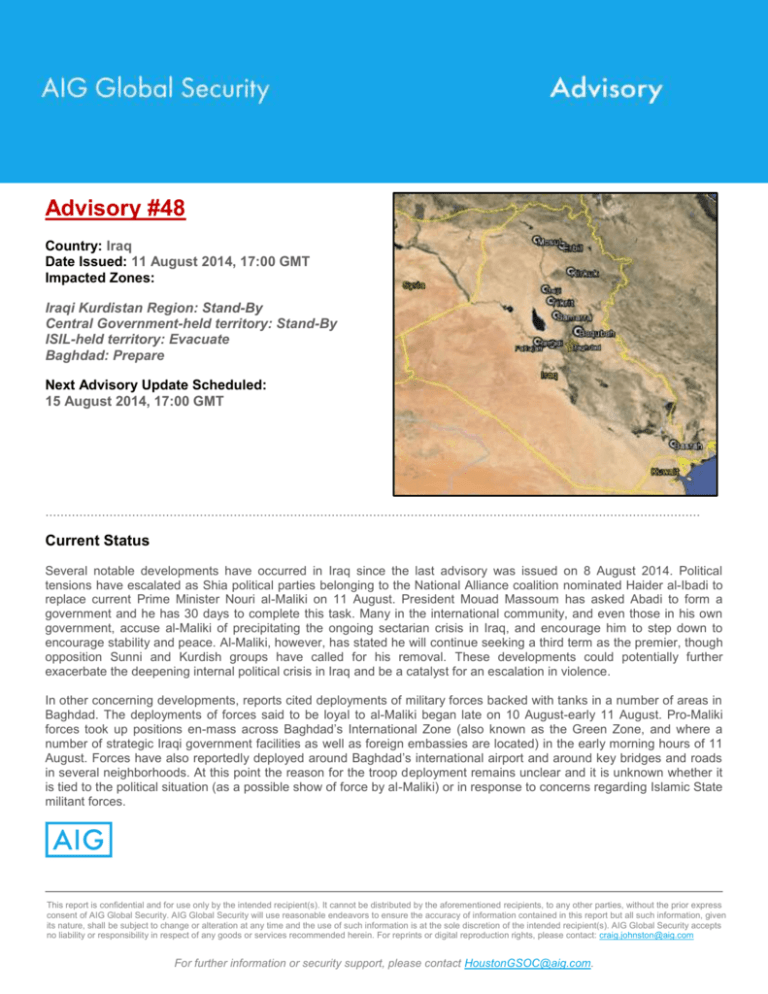
Advisory #48 Country: Iraq Date Issued: 11 August 2014, 17:00 GMT Impacted Zones: Iraqi Kurdistan Region: Stand-By Central Government-held territory: Stand-By ISIL-held territory: Evacuate Baghdad: Prepare Next Advisory Update Scheduled: 15 August 2014, 17:00 GMT ………………………………………………………………………………………………………………………………………………………… Current Status Several notable developments have occurred in Iraq since the last advisory was issued on 8 August 2014. Political tensions have escalated as Shia political parties belonging to the National Alliance coalition nominated Haider al-Ibadi to replace current Prime Minister Nouri al-Maliki on 11 August. President Mouad Massoum has asked Abadi to form a government and he has 30 days to complete this task. Many in the international community, and even those in his own government, accuse al-Maliki of precipitating the ongoing sectarian crisis in Iraq, and encourage him to step down to encourage stability and peace. Al-Maliki, however, has stated he will continue seeking a third term as the premier, though opposition Sunni and Kurdish groups have called for his removal. These developments could potentially further exacerbate the deepening internal political crisis in Iraq and be a catalyst for an escalation in violence. In other concerning developments, reports cited deployments of military forces backed with tanks in a number of areas in Baghdad. The deployments of forces said to be loyal to al-Maliki began late on 10 August-early 11 August. Pro-Maliki forces took up positions en-mass across Baghdad’s International Zone (also known as the Green Zone, and where a number of strategic Iraqi government facilities as well as foreign embassies are located) in the early morning hours of 11 August. Forces have also reportedly deployed around Baghdad’s international airport and around key bridges and roads in several neighborhoods. At this point the reason for the troop deployment remains unclear and it is unknown whether it is tied to the political situation (as a possible show of force by al-Maliki) or in response to concerns regarding Islamic State militant forces. This report is confidential and for use only by the intended recipient(s). It cannot be distributed by the aforementioned recipients, to any other parties, without the prior express consent of AIG Global Security. AIG Global Security will use reasonable endeavors to ensure the accuracy of information contained in this report but all such information, given its nature, shall be subject to change or alteration at any time and the use of such information is at the sole discretion of the intended recipient(s). AIG Global Security accepts no liability or responsibility in respect of any goods or services recommended herein. For reprints or digital reproduction rights, please contact: craig.johnston@aig.com For further information or security support, please contact HoustonGSOC@aig.com. Meanwhile, fighting persists between the Islamic State (IS) and Iraqi Security Forces. Additionally, Peshmerga – the security forces of the northern, semi-autonomous region of Kurdistan – continue to engage IS in various locations in northern Iraq, prompting the evacuation of thousands of residents from the towns of Sinjar and Zimar into the northern Kurdistan region. While Kurdish troops have reclaimed the northern towns of Gwer and Mahmour from IS militants, they lost control of the town of Jalawla. The U.S. government continues to carry out airstrikes on IS-occupied areas throughout northern Iraq in support of Kurdish troops. The U.S. Department of State announced on 10 August that it was evacuating some of its staff from the northern Kurdish city of Erbil as a precaution. Despite this drawdown of staff, the U.S. Consulate in Erbil remains open. The British Foreign and Commonwealth Office (FCO) has revised its travel information for Iraq as of 11 August, and is now recommending its nationals avoid travel to Erbil city and areas west of the city in the Erbil province. Sulaymaniyah and Dohuk province in the Iraqi Kurdistan region were not referenced in the call for travel avoidance. On 8 August, the Australian Department of Foreign Affairs and Trade (DFAT) updated its travel advice for Iraq and now recommends its citizens against travel to any area of the country, including the Kurdistan region. This announcement came amid heavy fighting between IS and Kurdish military forces in recent weeks. Various air carriers have canceled or modified their services in light of the ongoing conflict. Emirates Airlines has announced the indefinite suspension of flights to Baghdad International Airport (ORBI/BGW) on 9 August following an earlier suspension of flights to Erbil International Airport (ORER/EBL) by Emirates on 5 August. Additional flights by U.S. airline carriers were prohibited from flying over Iraqi airspace by the U.S. Federal Aviation Authority on 8 August due to prevailing security concerns. Security and political developments in the country remain fluid and should continue to be monitored; the next Advisory will be issued on 15 August unless developments warrant an update prior to this date. Potential Risks Attacks on areas located in the semi-autonomous Iraqi Kurdistan region Fall of Balad (Iraqi military base – Joint training installation) Ramadi/Fallujah militants push into Baghdad from west Capitulation of central government Major governments issue evacuation notice in direct response to current crisis Intervention from neighboring countries, in particular Iran or Saudi Arabia Significant increase in targeted killing of Western/foreign individuals Attack of prominent Shiite holy shrines by ISIL militants Outbreak of mass civil unrest or increase that affects majority of country and shows no indication of being resolved within a short time period Open conflict between Kurdish ethnic groups and the Iraqi military and/or Islamist militants For further information or security support, please contact HoustonGSOC@aig.com. Recommendations Foreign nationals and expatriates should re-assess any non-essential travel to Iraq at this time. All travelers should continue to monitor both local and international events to stay abreast of developing situations. Due to the developing nature of the situation, personnel are advised to secure all critical documentation and ensure that cellular telephones are fully charged. Security managers and directors should establish and maintain frequent contact with personnel in Iraq to monitor their status and location. Evacuation plans should be established immediately in the event that a departure or relocation becomes necessary. Adequate supplies of food, water and fuel should be on hand in the event that it becomes difficult to travel from one’s location. All overland travel should be carefully reviewed and only undertaken in areas with robust security measures in place; travel at night should be restricted if remaining in Iraq. For further information or security support, please contact HoustonGSOC@aig.com. Map data 2014 Basarsoft, Google For further information or security support, please contact HoustonGSOC@aig.com. Status Level Definitions STAND-BY •AIG Global Security recommends a Stand-By posture in response to recent developments. A standby posture includes the close and consistent monitoring of developments due to the potential for overall conditions to deteriorate or change quickly. PREPARE •AIG Global Security recommends a Prepare posture in response to recent developments. The Prepare advisory level indicates that the situation may escalate and that precautionary measures -including planning for a possible departure from the location -- should be implemented in the event of a significant deterioration in security conditions. EVACUATE •AIG Global Security has evaluated the situation as warranting an Evacuation from affected areas as noted in the advisory below. Contact should be established with security support personnel and preparations for a departure should be implemented. (Please note: The decision on the payment of your security evacuation claim will be made by the Claims Office and will be based on the Terms and Condition of the policy.) For further information or security support, please contact HoustonGSOC@aig.com.

